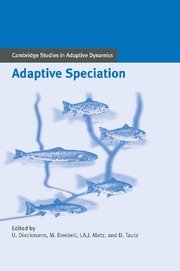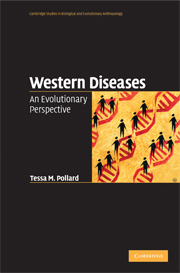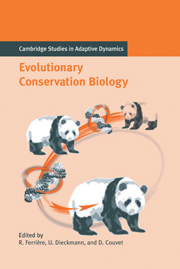Adaptive Dynamics of Infectious Diseases
In Pursuit of Virulence Management
$70.99 USD
Part of Cambridge Studies in Adaptive Dynamics
- Editors:
- Ulf Dieckmann, International Institute for Applied Systems Analysis, Austria
- Johan A. J. Metz, Universiteit Leiden
- Maurice W. Sabelis, Universiteit van Amsterdam
- Karl Sigmund, Universität Wien, Austria
- Date Published: January 2011
- availability: This ISBN is for an eBook version which is distributed on our behalf by a third party.
- format: Adobe eBook Reader
- isbn: 9780511825958
Find out more about Cambridge eBooks
$
70.99 USD
Adobe eBook Reader
Other available formats:
Hardback, Paperback
Looking for an inspection copy?
This title is not currently available on inspection
-
Emerging diseases pose a continual threat to public health. Short multiplication time and high variability allow pathogens to evolve very rapidly. It is therefore imperative to incorporate evolutionary considerations into longer-term health management plans. The evolution of infectious disease is also an ideal test-bed for theories of evolutionary dynamics. This book combines both threads, taking stock of our current knowledge on the evolutionary ecology of infectious diseases, and setting out the goals for the management of virulent pathogens. Throughout the book, the fundamental concepts and techniques underlying the modelling are carefully explained in a unique series of integrated boxes. The book ends with an overview of novel options for virulence management in humans, farm animals, plants, wildlife populations and biological control schemes. Written for graduate students and researchers, Adaptive Dynamics of Infectious Diseases provides an integrated treatment of mathematical evolutionary modelling and disease management.
Read more- First book to integrate mathematical evolutionary modelling and disease management
- Contains integrated boxes to review fundamental concepts and techniques behind the modeling
- Presents novel approaches to the evolutionary management of disease virulence
Reviews & endorsements
'… anyone with an interest in evolutionary dynamics will find several chapters that they wish to read (or ought to read).' TRENDS in Ecology and Evolution
See more reviews'Outstanding, intellectually stimulating, this is a meticulously researched book. It merits a prominent place on the bookshelves of researchers, teachers, and students who are concerned with the complex dynamics of infectious diseases.' Conservation Ecology
'… a starting point for further study … comprehensive references introduce a very extensive literature to facilitate this … the volume achieves its aims of being an introductory text for researchers to expand their range of knowledge and stimulate new enquiry.' Journal of Epidemiology & Infection
Customer reviews
Not yet reviewed
Be the first to review
Review was not posted due to profanity
×Product details
- Date Published: January 2011
- format: Adobe eBook Reader
- isbn: 9780511825958
- contains: 118 b/w illus. 12 tables
- availability: This ISBN is for an eBook version which is distributed on our behalf by a third party.
Table of Contents
1. Introduction Karl Sigmund, Maurice W. Sabelis, Ulf Dieckmann and J. A. J. Metz
Part I. Setting the Stage:
2. Alternative transmission modes and the evolution of virulence Paul W. Ewald and Guilio De Leo
3. Wildlife perspectives on the evolution of virulence Guilio De Leo, Andy Dobson and Andy Goodman
4. Adaptive dynamics of pathogen-host interactions Ulf Dieckmann
5. Dilemmas in virulence management Minus van Baalen
Part II. Host Population Structure:
6. Variation in susceptibility: lessons from an insect virus Greg Dwyer, Jonathan Dushoff, Joseph S. Elkinton, John P. Burand and Simon A. Levin
7. Contact networks and the evolution of virulence Minus van Baalen
8. Virulence on the edge: a source-sink perspective Robert D. Holt and Michael E. Hochberg
Part III. Within-Host Interactions:
9. Super- and coinfection: the two extremes Martin Nowak and Karl Sigmund
10. Super- and coinfection: filling the range Frederick Adler and Julio Mosquero Losada
11. Multiple infection and its consequences for virulence management Sylvain Gandon and Yannis Michalakis
12. Kin selection models as evolutionary explanations of malaria Andrew F. Read, Margaret J. Mackinnon, M. Ali Anwar and Louise H. Taylor
Part IV. Pathogen-Host Coevolution:
13. Coevolution of virus and host cell death signals David C. Krakauer
14. Biogeographical perspectives on arms races Michael E. Hochberg and Robert D. Holt
15. Major histocompatability complex: polymorphism from coevolution Joost B. Beltman, José A. M. Borghans and Rob J. de Boer
16. Virulence management and disease resistance in diploid hosts Viggo Andreasen
17. Coevolution in gene-for-gene systems Akira Sasaki
18. Implications of sexual selection for virulence management Claus Wedekind
19. Molecular phylogenies and virulence evolution Bruce Rannala
Part V. Multilevel Selection:
20. Weakened from within: intragenomic conflict and virulence Rolf F. Hoekstra and Alfons J. M. Debets
21. Ecology and evolution of chestnut blight fungus Douglas R. Taylor
22. Evolution of exploitation and defense in tritrophic interactions Maurice W. Sabelis, Minus van Baalen, Bas Pels, Martijn Egas and Arne Janssen
Part VI. Vaccines and Drugs:
23. Managing antibiotic resistance Sebastian Bonhoeffer
24. Evolution of vaccine-resistant strains of infectious agents Angela McLean
25. Pathogen evolution: the case of malaria Sunetra Gupta
26. Vaccination and serotype replacement Marc Lipsitch
Part VII. Perspectives for Virulence Management:
27. Taking stock: relating theory to experiment Maurice W. Sabelis and Johan A. J. Metz
28. Virulence management in humans Paul W. Ewald
29. Virulence management in wildlife populations Guilio De Leo and Andy Dobson
30. Virulence management in veterinary epidemiology Mart C. M. de Jong and Luc L. G. Janss
31. Virulence management in plant-pathogen interactions Andrew M. Jarosz
32. Management of virulence in biocontrol agents Sam L. Elliot, Maurice W. Sabelis and Frederick R. Adler
33. Epilogue Ulf Dieckmann, Karl Sigmund, Maurice W. Sabelis and Johan A. J. Metz.
Sorry, this resource is locked
Please register or sign in to request access. If you are having problems accessing these resources please email [email protected]
Register Sign in» Proceed
You are now leaving the Cambridge University Press website. Your eBook purchase and download will be completed by our partner www.ebooks.com. Please see the permission section of the www.ebooks.com catalogue page for details of the print & copy limits on our eBooks.
Continue ×Are you sure you want to delete your account?
This cannot be undone.
Thank you for your feedback which will help us improve our service.
If you requested a response, we will make sure to get back to you shortly.
×







